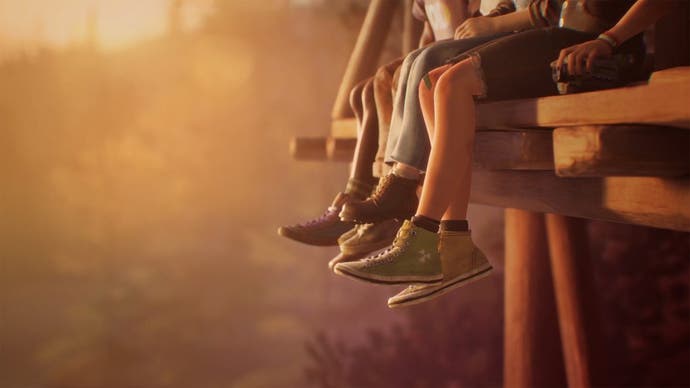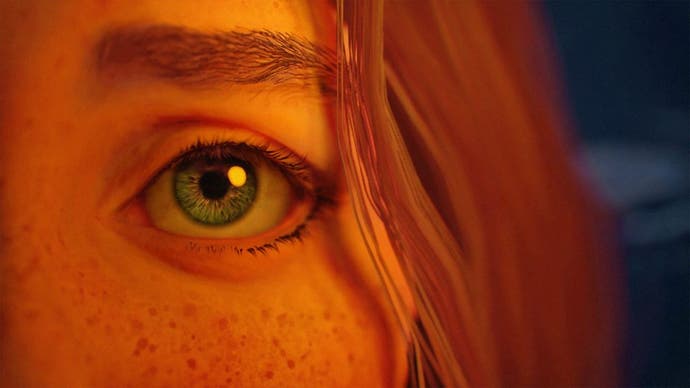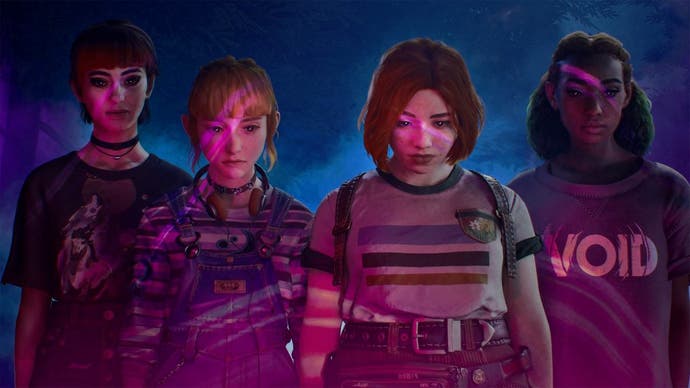Life is Strange creators discuss leaving their hit narrative adventure series behind, building on it with Lost Records
"In another universe, I would love to think of what could have been."
The team behind Life is Strange are no strangers to parallel timelines. Don't Nod's original narrative adventure ended with a binary choice - you could save the life of your closest companion, or doom them to protect the town you both grew up in. It was a decision that rippled through the stories of subsequent sequels, and remains an emotional peak the franchise has since struggled to surpass. Now, after years of silence, the team behind that ending are finally back with a new game - Lost Records: Bloom & Rage - ready to talk about why their time working on Life is Strange ended.
Much has changed for Don't Nod over the past decade, with the original Life is Strange team now an ocean away and under a brand new roof at the recently-established Don't Nod Montreal. Their time with Life is Strange is long over, following the conclusion of Life is Strange 2 at the end of 2019. Just over a year later, Eurogamer reported that Deck Nine Games, developer of the excellent Life is Strange prequel Before the Storm, was now the series' main developer - and it was indeed this studio that made 2021's enjoyable Life is Strange: True Colors.
"We really love what we did on Life is Strange and Life is Strange 2 but, as you know, the IP is owned by Square Enix, and at a point, we can only do what they want to do with the franchise," Don't Nod studio creative director and game director Michel Koch told me of the split between Don't Nod and the franchise they created. "We worked with them as the publisher, we sold them the franchise when we created it, and now they own it and decide how it evolves and where it goes."
If there were bad feelings here, there's no sign of them now. The break came at a natural point, Don't Nod says, and had advantages for the company - which itself was getting into publishing games. Suddenly, the need for a publisher like Square Enix was no longer necessary. Koch now describes their split Life is Strange as an "opportunity... a way for us to start on something new that we could still own creatively, that Don't Nod could publish, and where we as creators could really enjoy and have a kind of sandbox to work on something new, that we could really foresee and decide how we could make it evolve."
"I would have maybe loved to think of what could have been."
The timing of the split may not have been long planned, but the move for Koch's team out of Don't Nod's Parisian mothership - where other teams work on unrelated projects - to a specific studio of their own had previously been considered. "The Montreal adventure is something we've thought about for a while," said Luc Baghadoust, Don't Nod Montreal's studio executive producer and another Life is Strange veteran. "It's been maybe around 10 years, I remember discussing this with Oskar [Guilbert, Don't Nod's overall CEO]. The right moment was after Life is Strange 2, when we wrapped up that project. It was the right moment for Don't Nod, for the HQ and for us."
Still, though, did the team ever wonder about that other narrative path - where they were working on Life is Strange still? "I don't think there's that much mixed feelings," Koch says. "I mean, as a creator you sometimes would love to... in another universe, I would have maybe loved to think of what could have been, all these other games in the Life is Strange universe. But it's also good to see what other creators have come up with for the characters, in the comic book series, or the new characters and stories developed for Life is Strange: True Colors, which I played and really enjoyed."

Set to launch later this year, Don't Nod Montreal's new narrative adventure game Lost Records: Bloom & Rage is centred around four teenage girls in 1990s, with a second timeline following their adult lives in the present day. Clearly, Lost Records shares plenty of Life is Strange's DNA, with a focus on young adult friendships and a similar dose of magical realism. There's also, this time around, a plan for the series and its characters to continue - something the original Life is Strange ending was not written with in mind.
"We already know where we could go in the future..."
"It's an adventure game," Koch says, "so you have the staples of the genre we had before with choices, dialogue options, environmental storytelling and exploration. You will feel at home with that." That said, Koch acknowledges it's also been "several years" since their last game - and his team is keen to have not let the grass grow under their feet. "How can we make the player have agency in a different ways? How can we improve interactivity? How can we invent new dialogue systems or ways for players to interact with the game?" For now, the answers to those questions lie under wraps - though it's reassuring to hear these are questions being considered.
"With this game we're also setting up the cornerstones of, maybe, something bigger where we can directly write those characters in a way where we know we can bring them back, where we can have other stories with those characters, with the world and universe we're creating," Koch said. "We already know where we could go in the future to tell other stories within the same setting and the same set of characters in the future - if things go well."
But balancing the ability for players to make seismic choices - like the ending of Life is Strange 1, which split a game's narrative with the desire to continue on and pick up diverging story threads - is not easy, Koch admits. Other game series have struggled, but Don't Nod Montreal are not put off. "We will have really different endings in the game with a lot of player agency," Koch says. "I'm still really proud of the 'bay or bae' ending and how you definitely create two paths that are very different with your decisions, and we want to keep this kind of agency for players where they feel they have defined parts of the story, and that they have a real voice with their character and within the story of the game."
How will Bloom & Rage do this? Don't Nod Montreal isn't quite yet ready to say, but the hints I got sounded intriguing. "We are working with some ways and elements in the storytelling that will allow us to still go back to games even if there are different branches," Koch teased. "It's a balance to find because of course, we cannot make one game that has X number of endings, then the next game you have to start with X different starting points. We have to find ways to come back to common links because we cannot make an infinity of branches. But we know we have ways with the storytelling to make that happen that will still feel very powerful for the players - we should reveal some of that at a later date."
Bloom & Rage features four main characters, but Koch told me that the game would again feature a single protagonist character for players to get to know, and help shape. "I feel like sometimes when you switch point of view, you get disconnected," Koch says, of story-based games where you control multiple characters. "It gives more of a feeling being a mastermind storyteller rather than really caring about the one character. We really want to focus on you finding your place within this group of friends." This is even more important in Lost Records: Bloom & Rage as the story hinges on the characters' relationships not just as teenagers but in their adult life, as well - something Koch notes is completely new for his team.

"You will get the adults' point of view, whereas in our previous games it was always teenagers," he says. "We're getting older ourselves, and our audience is growing up and getting older, and we were thinking it was interesting to still talk about teenagers but also showcase another point of view. Like, how do you reflect on who you were as a teenager, growing up today?" Doing so requires a strong knowledge of your characters and the ability to craft them authentically - especially, in this case, with a main cast that's all female.
"We started to work on the big story and characters with Jean-Luc Cano, writer of Life is Strange 1 and 2, but really early in the process we also looked to who else we wanted to work with," Koch says. "We hired two American writers, Desiree Cifre and Nina Freeman, who are both working with us very closely, writing the characters by finding their voices. We really relied a lot on them, on their knowledge of American culture, and of course on female characters, to really make sure we create them in a respectful way, and in a meaningful way that feels natural for how women in 2022 would speak, and how our teenage girls in 1995 would speak and interact together. We're really lucky to be working with them on this project."
"I started in the industry in 1998 and at that time, we were 13 percent women at Ubisoft Montreal."
Having a focus on creating authentic characters is something Don't Nod Montreal says was key to the founding of the studio, and the hiring of talent by its managing director Frederique Fourny-Jennings, a games industry veteran that served over a decade at nearby Ubisoft Montreal. "When we met and started thinking of the culture we wanted to have for the studio, one of my goals was to bring some parity between men and women," Fourny-Jennings says. "I started in the industry in 1998 and at that time, we were 13 percent women at Ubisoft Montreal - and most of those women were in the administration team.
"Because I work in production, I was often the only woman on the team amongst a lot of men - and I've been very lucky. But I know because I worked with a lot of women around my career that not everyone has faced difficult situations the same way. So it was very important for me and Michel to make sure we had an environment where women could express themselves with the normal freedom everyone should have everywhere. We want everyone to have a voice at this table. At the minute, we're like 47 percent women in the studio.
"On top of that, we are in Montreal where there's a lot of immigration, a lot of diversity of backgrounds, and a lot of different ways to see life and live your teenage years," Fourny-Jennings continues. "We have people from Brazil, Mexico, France, from the remote north Quebec. I grew up in Africa, and although I'm of French descent, it was a different teenage era - even though I was not a teenager in the 90s! But still, I was a teenager at some point. It's important we are able to bring these voices, and that our studio culture is infused with all these backgrounds that go into the game naturally, organically."
Somewhere else in the Life is Strange multiverse, the Don't Nod Montreal team might still be working on games starring Max and Chloe. But here in the real world, in 2024, that same group of people is creating something new instead - and if I had to choose, it sounds like an option well worth exploring.









